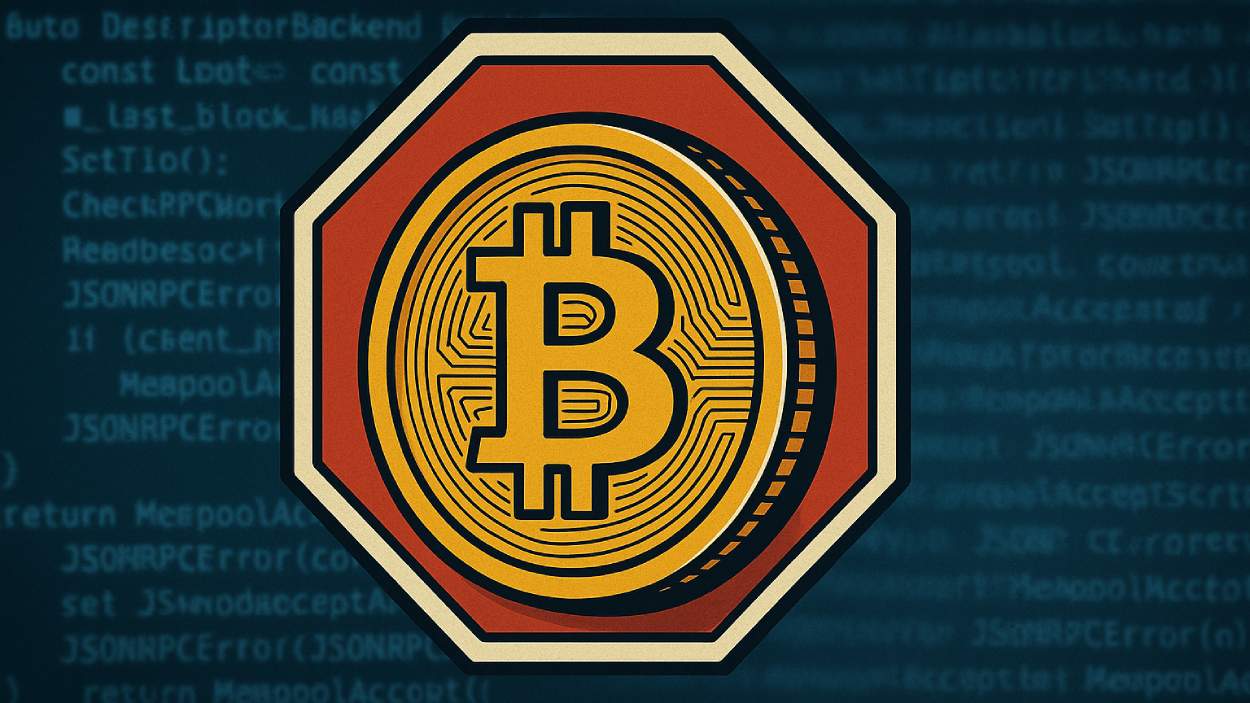Bitcoin Core v30.0 has launched with significant upgrades and a controversial data policy change that is dividing the Bitcoin community.
Quick Summary – TLDR:
- Bitcoin Core v30.0 is now live, introducing lower transaction fees, a new wallet system, GUI improvements, and a major OP_RETURN data limit increase.
- The OP_RETURN limit jumped from 80 bytes to 100,000 bytes, enabling more non-financial data in transactions but drawing legal and ideological concerns.
- Prominent figures and communities like Bitcoin Knots and Nick Szabo oppose the update, citing risks of illegal content and deviation from Bitcoin’s original purpose.
- While some developers praise the update for its potential in building decentralized apps, others warn it could lead to a repeat of the 2017 Blocksize Wars.
What Happened?
Bitcoin Core v30.0 has officially rolled out, bringing multiple updates aimed at improving performance, usability, and functionality. The most talked-about change is the expanded OP_RETURN data limit, which now allows users to attach up to 100KB of data per transaction. This has sparked strong reactions from developers, users, and node operators alike.
While some see it as a step forward for innovation on the Bitcoin network, others believe it risks both Bitcoin’s technical integrity and legal safety for node operators.
Bitcoin Core v30 is a mistake.
— Ox HaK (@oxhak) October 12, 2025
Removing OP_RETURN limits opens the door to endless junk data, inscriptions, and fee spikes that punish regular users.
Bitcoin’s strength is its minimalism — not turning the base layer into a playground for experiments.
New Features and Technical Upgrades
The v30.0 release delivers several technical improvements that will benefit node operators, miners, and developers:
- Lower default fees: Nodes can now relay transactions at 0.1 sat/vB, and miners can include them with a minimum of 0.001 sat/vB.
- Wallet upgrade: BDB wallets are no longer supported. Users must migrate to descriptor wallets, which are more secure and easier to back up. Wallet commands like importwallet and dumpwallet are deprecated.
- Improved interface: The GUI has been updated from Qt5 to Qt6. Windows now supports dark mode and macOS users get Metal graphics support for smoother visuals.
- Simplified command usage: New bitcoin commands make node interaction easier. This includes bitcoin node, bitcoin gui, and bitcoin rpc.
- Experimental PC Mining Interface: Allows miners to connect directly through local sockets, improving block template request speed.
- TRUC Transactions: Helps avoid conflicts during transaction confirmation.
The OP_RETURN Controversy
The heart of the debate centers around the increased OP_RETURN limit. Previously capped at 80 to 83 bytes, the new 100KB limit opens the door for embedding larger volumes of metadata, hashes, certificates, and even art into the blockchain.
Arguments in Support:
- Developers like Ark Labs’ Alex Bergeron are excited to “use all of the additional OP_RETURN space” to build more Ethereum-like applications on Bitcoin.
- Supporters say this expands Bitcoin’s utility, enabling decentralized apps and broader use cases.
Arguments Against:
- Critics, including Satoshi Labs co-founder Pavol Rusnak and cryptographer Nick Szabo, worry that hosting such large amounts of data could expose node operators to legal risks, especially if illegal content like CSAM gets stored.
- Szabo noted, “Without adding safeguards… node operators will often be held criminally liable.”
- The Bitcoin Knots community, led by Luke Dashjr, continues to oppose the update. Knots allows users to set their own OP_RETURN data limits and has seen a rise in usage, now powering over 21 percent of all nodes.
Silent Setting Changes
An additional concern is how the -datacarriersize setting works. In older versions, 83 meant 83 bytes. Now, the same value in v30 allows nine times more data, which critics say could mislead users who aren’t aware of the policy change.
Memories of the Blocksize Wars
This situation echoes the 2017 Blocksize Wars, which split the community and led to the creation of Bitcoin Cash. While Core v30’s change is not a consensus-level protocol update, it does reignite philosophical tensions within the community over Bitcoin’s identity.
The Blocksize Wars taught the value of user-driven consensus. Similarly, the OP_RETURN issue shows how deeply community governance and technical direction are intertwined. Though no fork has occurred, leaked messages once hinted at Luke Dashjr exploring a temporary fork, which he later denied.
Legal Risks and Decentralization Concerns
The change brings not just technical but legal implications. By enabling large data payloads, node operators may unknowingly store prohibited content, risking legal action. Some experts warn this could dissuade people from running nodes, threatening the decentralized fabric of Bitcoin itself.
Without tools to remove illegal content from nodes, operators may have to choose between legal compliance and maintaining a full node.
Future Innovations or Identity Crisis?
While critics are worried, others believe this upgrade could spark the next wave of Bitcoin innovation:
- Better metadata support for crypto payrolls and compliance.
- New decentralized applications that leverage non-financial data on the Bitcoin blockchain.
- Potential expansion into multi-purpose ecosystems like Ethereum, but built on Bitcoin’s base.
Still, some fear Bitcoin is drifting away from its original vision. The OP_RETURN change has prompted deeper conversations about what Bitcoin should be: a cash system or a general-purpose network.
SQ Magazine Takeaway
This update really hits a nerve. On one side, it opens a whole new world of possibilities. Imagine embedding contracts or certifications directly into the blockchain. But on the other side, we’re risking exactly what made Bitcoin special in the first place: simplicity, decentralization, and trust. I get why people are worried. If running a node means you might unknowingly host something illegal, that’s a serious problem. For me, this isn’t just a tech update. It’s a turning point in how we define Bitcoin moving forward.


































































